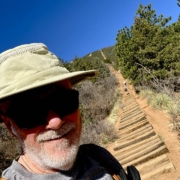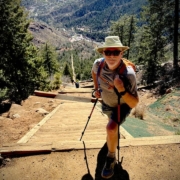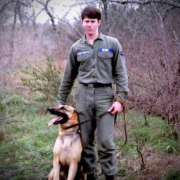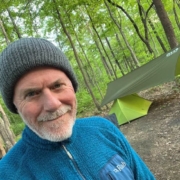Your Brain on a Hobby | Healthy Aging Series: S10 E10
This is Your Brain on a Hobby
Last spring, I planned a camping trip with my three brothers. Really it was a short backpacking trip. I told them I was channeling my mother, as in, being an anchor for my siblings holding us together.
The Aging Neese Boys
We are all in our 60s and I tailored the trip for them since they are not backpackers. 1 mile in and 1 mile out with an elevation increase of 100 feet. Easy Peezy. They loved it and I loved it.
We talked about healthy aging, and the things you need to do to prepare for healthy aging. My brother Tim said, “Don’t forget you need a hobby!”
Backpacking is My Hobby
I am lucky. My hobby is backpacking. Here is a brief description of what I do. I take a 60 liter backpack and fill it with a tent, a sleeping pad, a sleeping bag (40° bag for the summer and 20° bag for the fall winter and spring), a stove, food (mostly freeze dried), a satellite communication device, or a Garman, a battery pack, a chair, a titanium cooking pan, a cup and dishes, a water filter, a headlamp, and whatever snacks I want. My preferred weight for a backpack is less than 30 pounds. I’ve packed in as much as 75 to 80 pounds at the Canyonlands National Park, where I had to pack in 16 L of water, that’s probably close to 35 pounds of water. Then I saddle up and pack into a remote area: Red River Gorge, Great Smoky Mountains National Park, Canyonlands NP, Grand Canyon NP, or something local. Three to 5 miles is a good distance for a first day. I prefer backpacking with someone, but I also enjoy the solitude of being by myself. Hence, I carry a Garman satellite communicator.
Me Doing My Hobby in Canyonlands National Park
There’s nothing easy about this hobby. I train every week so that I can do what I enjoy doing. That means putting on a 45-pound backpack and doing hill-repeats once a week. That means I’m on trails three or maybe four times a week. That means I do a lot of resistance training and core training. This last year, I did what I call a “death march.” I was backpacking with two younger men, almost 20 years younger, in Canyonlands National Park, Utah. We were headed to the Peekaboo Campground named for a small opening in the canyon wall, providing a shortcut to the adjacent canyon, mimicking what you might see when you use your hands to cover your face playing peekaboo. In Canyonlands, everything looks like something else. Elephant canyon has elephants standing at this entrance. The Needles look, well not exactly like needles, but more like the rockets built by SpaceX. I guess like space needles. The slickrock formations look like waves of limestone and get their name from the early settlers because their horses and metal rimmed wheels couldn’t get safe traction. Backpackers welcome the slickrock as it gives them a break from trudging on sandy trails through the canyons, feeling like you’re doubling your mileage. Canyonlands National park is located in the southeastern part of Utah near Moab. I say, near Moab, but the Needles District is 85 miles from Moab.
I’m a Backpacking Nerd
I could go on and on about the places where I backpack….and so I will!
Canyonland National Park is one of the most isolated places in the continental United States. It has three districts: The Maze, The Needles, and Island in the Sky, which is nearest to Moab, which means more people. The line to get into Island in the Sky could be a couple miles long at times. In contrast, the Hans Flatt Ranger Station, in The Maze, is 50 miles from the nearest paved road. The drive is beautiful, but you need to be able to navigate large sand dunes that form across the road. To get to the trailhead, you need a four-wheel-drive vehicle for the 30-mile trek that usually takes two hours. There are no lines getting into The Maze and on a four-day backpacking trip you might see five or 10 people, all kindred souls. On our trip to Peekaboo, we got to the trailhead at 3 PM, which would’ve been good if we were staying in Lost Canyon Campground (LC 1) where I usually stay, but the Peekaboo Campground was 2 1/2 miles past LC 1. The problem was, we couldn’t get reservations for LC 1, so we were committed to Peekaboo campground. And then, there’s the October heat. I would never backpack in Canyonland in the summer or winter, it’s too hot and too cold. October can be a little warm as well. Heat drains the energy out of you. We saddled up and headed to Peekaboo and hit our first slip rock formation. it was a relief. We hit LC 1, which would’ve been a great place to stop but pushed on.
Hobbies Aren’t Always Fun
I remember describing some of my “hobby adventures” to my father. His regular comment was, “Kimberly (that’s what my parents called me), that doesn’t seem like fun.” Backpacking into Canyonlands usually isn’t fun, but it is so rewarding!
I’m not sure when my two backpacking buddies got into the Peekaboo Campground, but it was well past dark, and I was using my headlamp for the last hour. The darkness was disorienting and with my headlamp it was difficult following the cairns, those little piles of stones marking the train. I pulled into the campground, drank as much water as I could drink, and went to bed being completely exhausted.
I won’t tell you how the rest of the three-day trip went, but I wanted to give you a little idea of what I do when I backpack. It is challenging and rewarding at the same time. The landscape is beautiful. The night sky is always full of the stars, with a dim view of the Milky Way when there is no moon. Oftentimes, when there’s a moon and I’m backpacking, it’s almost as if somebody has turned on the streetlights in the neighborhood. Regardless of how warm it gets during the day, the high desert cools down for a very comfortable sleep.
This is my hobby. My hobby challenges me and takes me into places where very few people have been. I’ve backpacked into the John Muir Wilderness to a place called Guitar Lake, which sits at the western side of Mount Whitney. Very few people have been in that part of the country on foot. I’ve been to Alaska Basin in the Tetons in August. The sides of the basin are covered with wildflowers . I’ve done solo backpacking trips into the Grand Canyon and into the Red River Gorge. Hiking is also one of my hobbies which brings nearly the same experiences. I’ve explained to people that backpacking and hiking are a form of high intensity interval training, especially when you hike in Kentucky due to all the hills. My cardio health is excellent according to my Fitbit watch. Remember: What’s good for the heart, is good for the brain. One of the things that backpacking does is, it creates a situation where you are likely to dissociate while you’re on the trail. You let your mind go and allow your unconscious thoughts to come to consciousness. Often times, when I’m hiking or backpacking, I am having some of my most creative thoughts and ideas.
I thoroughly enjoyed my time with my brothers backpacking in the Hoosier National Forest this past spring. It gave me an opportunity to get out into the woods, stay out all night in the wild, and enjoy the company of those who enjoy the sport as well.
What’s your hobby?
My brother Tim’s hobbies are painting, hunting, and playing the guitar. They bring him lots of satisfaction, and I think are helping to slow down his aging process. Really, that’s what a good hobby should do. It should slow down the aging process.
Your hobby doesn’t have to be as extreme like my hobby, but find one that you can develop a passion for, and then fill your life with it as you age, and it will slow down the aging process, and possibly even save your life.


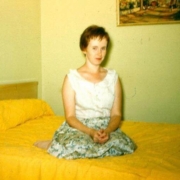


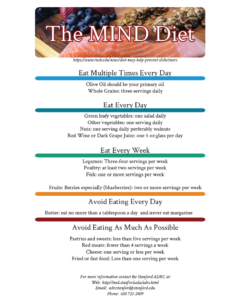 Question About the Mind Diet
Question About the Mind Diet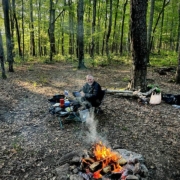

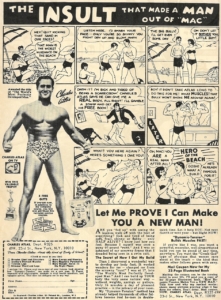 A Real Man?
A Real Man?